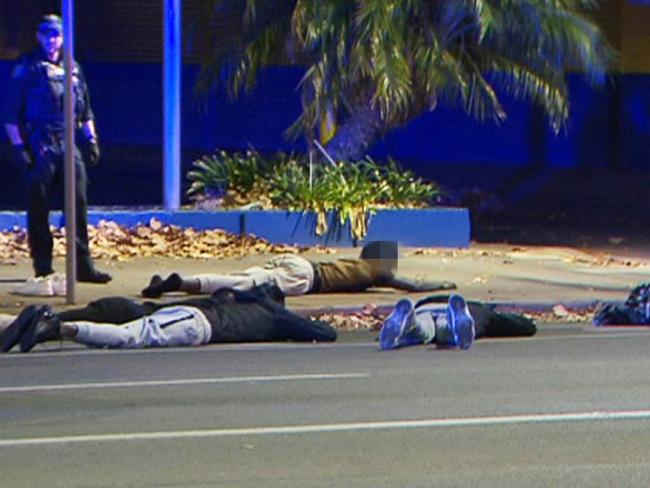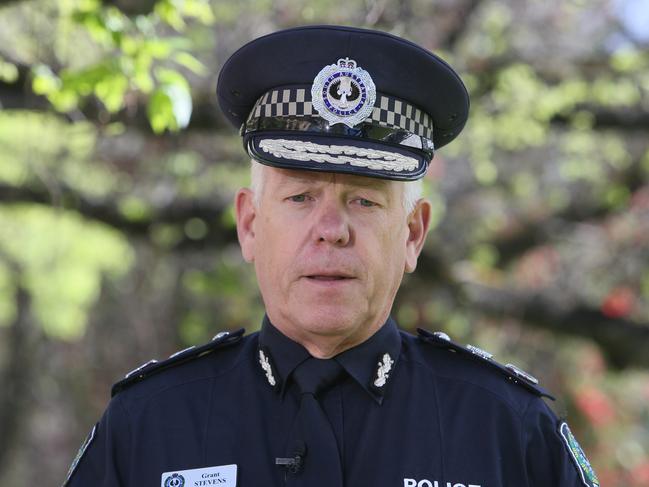Terror teen, 13, amassed 233 charges in a year amid
One of SA’s worst repeat young criminals was 13 when they amassed more than 200 charges in a year, as more children are found guilty of attacks, robberies or stealing. See the data.
SA News
Don't miss out on the headlines from SA News. Followed categories will be added to My News.
One of South Australia’s worst repeat young criminals was 13 when they amassed more than 200 charges in a year, as more children are found guilty of attacks, robberies or stealing, according to official figures.
As the state government considers overhauling youth crime laws, new statistics obtained under Freedom of Information show children or teenagers were convicted of almost 18,400 offences over the past five years.
Despite overall offending falling, Courts Administration Authority data shows increasing 13-year-old convictions since 2017-18, while more juveniles aged 12, 14 and 16 were found guilty in the past financial year.
But in what the state’s victim’s rights tsar and MPs described as worrying, 1419 criminals aged between 10 and 12 were convicted of serious crimes in that time, the data showed.
The most common offences were theft-related – with 3877 incidents – and 3861 crimes “against justice procedures and government security” – such as breach of bail.
More property damage, including graffiti or environmental pollution, was recorded (2209) along with 2095 assault-type incidents.
There were nine murders or similar offences since 2017.
In the past five years, a league table of recidivist offenders shows a 13-year-old was charged 233 times during 2019-20.
A teenager aged 16 amassed 187 charges in 2020-21, while a 15-year-old was charged 178 times last year.
No further details were released, including if they were the same offenders.
There were also 72 youth court trials last year, which was six more than 2020-21.
Senior police say Indigenous offenders are disproportionately high in SA’s jails while many repeat youth offenders are wards of the state.
Police, and magistrates, have a “strong preference” to keep children out of detention.
The state government is considering lifting the criminal age of responsibility from 10 to 14 years.

SA-Best’s legal spokeswoman, upper house MP Connie Bonaros – who backs a criminal age of 14 with appropriate services – said she was “deeply troubled” at habitual offenders.
No child should face dozens of charges, she said, but many offenders “know no better” or custody was more stable and secure.
“While these statistics are deeply disturbing, they are further evidence of the broader issues plaguing our society,” she said.
“This is not just proof of our broken juvenile justice system – it is much broader and … deeper issue than that. We’re not born criminals.”
Victims’ Rights Commissioner, former police assistant commissioner Bronwyn Killmier, who is against raising the criminal age, said many victims of house breaks or car thefts faced financial ruin and a lifetime of emotional trauma.
“It doesn’t matter what age the offenders are … victims still suffer loss and trauma from their crimes,” she said. “They are the ones disadvantaged and sometimes this can last for life.”
Operation Meld detectives are grappling with African crime gangs while there has been a spate of home break-ins and car chases involving youths. During one last year, a nine-year-old boy was stabbed outside his Unley home.

Police Commissioner Grant Stevens was pleased with an overall fall in youth crime and rejected SA had a youth gang problem.
He said recidivist criminals often offended over many years.
He said small numbers of high-risk children often lived in homes with poor supervision, no positive role models, domestic violence, drug and alcohol abuse, mental health issues, and poverty while engaging in extensive truancy from school.
“Our primary concern is the offending that puts other people at risk,” he said.
“So we’re obviously worried about offences of violence and robbery.
“I think it’s worth remembering the vast majority of children who come into contact with the criminal justice system … never come back.”

He added: “It’s just that one-off occasion when they’ve done the wrong thing, and they benefit from the way the system currently deals with them. I would argue the current system is not broken.
“I think it serves the vast majority of young people very well.
“What concerns me is that we’ve got young people who aren’t being properly supported – either by their families or not able to access services and support that will prevent them from becoming recidivist offenders.”
Federal figures show Australia spends $2.7bn on youth crime a year.
The Law Society wants a new bail mentoring program and better rehabilitation programs in SA, especially for children aged under 14.
President James Marsh said many youth criminals had “acute” disadvantaged and traumatic lives.
“The cycle of young people being arrested and kept in police custody for breach of bail … risks entrenching youth people in the criminal justice system,” he said.
Lawyer Casey Isaacs, who practises extensively in the Youth Court, believes “more sustainable solutions” are needed with education, training and rehabilitation.
“It is not a long-term solution to get these kids into a court environment, tell them off, send them to jail in some cases and then return them to the exact circumstances in which they were committing crimes,” he said.
Commissioner for Children and Young People, Helen Connolly, said it was “genuinely pleasing” to see youth crime rates fall.
“We have an obligation to intervene on children’s behalf and apply a process of support and rehabilitation that is attuned to each child’s … circumstances,” she said.
Attorney-General Kyam Maher said: “While the overall drop in youth crime is cause for cautious optimism, the changing spread of offences would need to be considered by any proposal to raise the age.”
Youth Court Judge Penny Eldridge was unable to comment.
PUSH FOR RAISING CRIMINAL AGE TO 14
The state’s top judges support lifting the age of criminal responsibility to 14 as authorities explore raising it in stages with exceptions for serious crimes.
Chief Justice Chris Kourakis and Youth Court Judge Penny Eldridge want criminal exemptions for children aged 10 to 13, a federal report reveals. The Law Society also “strongly supports” lifting the age to 14.
The SA Greens last year proposed draft laws to increase the minimum age of criminal responsibility to 14.
The legislated age is 10 across Australia. The state’s Attorney-General’s Department is now involved in a Commonwealth working group investigating potential law changes.
Senior government sources said there is a growing “consensus” that it was a “good outcome” to stop young children being treated like criminals.
One option being explored was to lift the age to 12 in the first instance but introduce “carve out” offences for juveniles accused of very serious crimes such as murder, manslaughter, causing death by dangerous driving or rape.
Prosecutors had to prove a youth guilty beyond reasonable doubt but also disprove a child younger than 14 being “criminally incapable”, under the legal principle “doli incapax”. “It would be foolish to implement a change without knowing the consequences … of how it’s going to affect young people and community safety,” a senior official said.

The Council of Attorney-Generals recommended in 2020 raising the minimum age to 14 years “without exception”, according to a secret 140-page draft report published in December last year. SA’s judicial support was “conditional” on who will address youth behaviour, it said.
“The fact the cohort would no longer be charged with an offence, and will not be entering the youth justice system, will not mean their anti-social and at risk behaviours will cease,” said the judges, who still hold their 2020 views.
Director of Public Prosecutions, former Supreme Court Justice Martin Hinton KC, had no view but warned: “Raising the age will exclude some children, who possess capacity to understand the serious wrongness of their conduct from any form of intervention or punishment within the criminal justice system.”
While SA Police told the inquiry it was “not supportive” of change, Commissioner Grant Stevens said there was now no formal view.
Senior officers were advising the review. “We would not support raising the age … if there wasn’t an alternative framework to take over from the work that police currently do with young offenders,” he said.
The council will next month meet as it seeks a national consensus amid a split among states. State Cabinet will need to approve any SA changes.
Attorney-General Kyam Maher said the national working group would guide him.
“Breaking the cycle of unsafe behaviours is a complex issue,” he said. “I support any measure which achieves this, but which also keeps our communities safe.”




